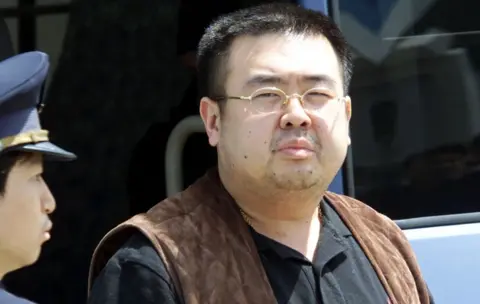Kim Jong-nam: Indonesian woman freed in murder case (original) (raw)
Kim Jong-nam: Indonesian woman freed in murder case
The Indonesian woman accused of killing Kim Jong-nam, the half-brother of North Korea's leader, has been freed after charges against her were dropped.
Siti Aisyah had been accused of smearing VX nerve agent on Mr Kim's face in Kuala Lumpur airport in 2017.
She and her co-accused, Vietnamese Doan Thi Huong, deny murder and say they thought they were part of a TV prank.
The brazen killing at an international airport left observers stunned and gripped international headlines.
After several months of delay, the defence phase of the trial was set to begin Monday, with testimony from Ms Huong.
However, the prosecutor in the case requested the murder charge for Siti Aisyah be dropped, without giving a reason.
In a letter to the Indonesian law minister though, Malaysia's attorney general explained the decision was taking into account considerations Jakarta raised about the case as well as the good relations between the two countries.
The judge approved the request, saying "Siti Aisyah is freed", according to AFP news agency. However, this does not amount to an acquittal.

 Reuters/AFP
Reuters/AFP
Doan Thi Huong (left) and Siti Aisyah (right) say they were tricked by North Korean agents into carrying out the killing
Ms Aisyah could have faced the death penalty if convicted.
"I feel happy. I did not know this will happen. I did not expect it," AFP cites Ms Aisyah saying as she left the court.
BBC correspondent Jonathan Head, who is at the court in Kuala Lumpur, says there appears to have been less evidence against her than against her Vietnamese co-defendant.
Ms Huong had initially been expected to read a statement in court, which would have been the first time either of the two gave testimony. However, her case has now been adjourned at the request of her lawyers.
How did the murder happen?
Kim Jong-nam, the estranged half-brother of North Korea's leader Kim Jong-un, had been waiting to board a flight from Kuala Lumpur to Macau on 13 February 2017 when two women approached him in the departure area.
CCTV footage showed one of them placing her hands over his face, then both women leaving the scene.
Mr Kim died on the way to hospital from what was later found to be exposure to the nerve agent VX, one of the most toxic of all known chemical agents.
North Korea has fiercely denied any involvement in the killing, but four men - believed to be North Koreans who fled Malaysia on the day of the murder - have also been charged in the case.
They remain at large despite an Interpol "red notice", equivalent to an international arrest warrant.
What is the women's defence?
The two women have said they were innocent victims of an elaborate North Korean plot.
According to their lawyers, in the days before Mr Kim's death the women had been paid to take part in pranks where they wiped liquid on people at airports, hotels and shopping malls.

 AFP/Getty Images
AFP/Getty Images
Kim Jong-nam, pictured in 2001, the late half-brother of North Korean leader Kim Jong-un
They thought they were taking part in another prank at the airport. Their lawyers had expressed confidence that the court would see they had no motive to kill Mr Kim.
After the court's surprise decision on Monday, the Indonesian ambassador to Malaysia told reporters they would "try to fly Siti back to Indonesia today or as soon as possible," according to AFP.
Who was Kim Jong-nam?
Kim Jong-nam was the older half-brother of North Korea's authoritarian ruler, Kim Jong-un.
He was once seen as a future leader of the isolated country, but when his father Kim Jong-il died, was bypassed in favour of the younger Kim.
He was largely estranged from the family, and spent most of his time overseas in Macau, mainland China and Singapore.
He had spoken out in the past against his family's dynastic control of North Korea, and in a 2012 book was quoted as saying he believed his half-brother lacked leadership qualities.